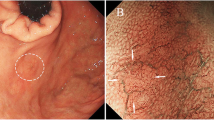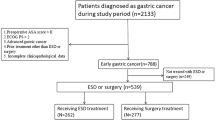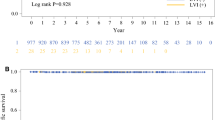Abstract
Background
The degree of intratumoral microvascular density is thought to affect tumor metastasis and prognosis in various human cancers, including gastric cancer. Despite recent medical advancements, gastric adenoma or adenocarcinoma remains a considerable therapeutic challenge. Endoscopic submucosal dissection (ESD) is a more recent approach that is now commonly used for radical resection of gastric adenoma and adenocarcinoma.
Aim and Methods
The expression of vascular endothelial growth factor (VEGF), epidermal growth factor receptor (EGFR), and interleukin-6 (IL-6) are related to the prognosis of gastric adenocarcinoma. However, the expression of these factors in gastric adenoma/adenocarcinoma following ESD has not been clearly evaluated. Here, we report on our study of the expression of VEGF, EGFR, and IL-6 by immunohistochemical staining in extracted tissue from adenoma or adenocarcinoma of the stomach by ESD and subsequent evaluation of the correlation of VEGF, EGFR, and IL-6 with other clinicopathological parameters. The patient cohort consisted of 102 patients with adenoma or adenocarcinoma of the stomach.
Results
Immunohistochemical staining for VEGF and IL-6 was significantly higher in both high grade dysplasia and adenocarcinoma than in low grade dysplasia (P < 0.05). There was significant correlation between histological grade and intensity of immunohistochemical staining of VEGF (P = 0.039). Histological differentiation of adenocarcinoma was related to IL-6 expression (P = 0.028). The immunoreactivity of VEGF and IL-6 increased significantly in lesions >2 cm compared to lesions <2 cm (P < 0.05).
Conclusion
The immunohistochemical expression of IL-6 and VEGF can be considered to be useful for clinical diagnosis and follow-up of adenoma or adenocarcinoma of the stomach.



Similar content being viewed by others
References
Folkman J. What is the evidence that tumors are angiogenesis dependent? J Natl Cancer Inst. 1990;82:4–6.
Tomoda M, Maehara Y, Kakeji Y, Ohno S, Ichiyoshi Y, Sugimachi K. Intratumoralneovascularization and growth pattern in early gastric carcinoma. Cancer. 1999;85:2340–2346.
Senger DR, Connolly DT, Van de Water L, Feder J, Dvorak HF. Purification and NH2 terminal amino acid sequence of guinea pig tumor-secreted vascular permeability factors. Cancer Res. 1990;50:1774–1778.
Connolly DT, Heuvelman DM, Nelson R, et al. Tumor vascular permeability factor stimulates endothelial cell growth and angiogenesis. J Clin Invest. 1989;84:1470–1478.
Maeda K, Chung YS, Ogawa Y, et al. Prognostic value of vascular endothelial growth factor expression in gastric carcinoma. Cancer. 1996;77:858–863.
Inoue K, Ozeki Y, Suganuma T, Sugiura Y, Tanaka S. Vascular endothelial growth factor expression in primary esophageal squamous cell carcinoma. Association with angiogenesis and tumor progression. Cancer. 1997;79:206–213.
Toi M, Hoshina S, Takayanagi T, Tominaga T. Association of vascular endothelial growth factor expression with tumor angiogenesis and with early release in primary breast cancer. Jpn J Cancer Res. 1994;85:1045–1049.
Paley PJ, Staskus KA, Gebhard K, et al. Vascular endothelial growth factor expression in early stage ovarian carcinoma. Cancer. 1997;80:98–106.
Fontanini G, Vignati S, Boldrini L, et al. Vascular endothelial growth factor is associated with neovascularization and influences progression of non-small cell lung carcinoma. Clin Cancer Res. 1997;3:861–865.
Yonemura Y, Endo Y, Fujita H, et al. Role of vascular endothelial growth factor C expression in the development of lymph node metastasis in gastric cancer. Clin Cancer Res. 1999;5:1823–1829.
Ferrara N, Davis-Smyth T. The biology of vascular endothelial growth factor. Endocr Rev. 1997;18:4–25.
Lang SA, Klein D, Moser C, et al. Inhibition of heat shock protein 90 impairs epidermal growth factor-mediated signaling in gastric cancer cells and reduces tumor growth and vascularization in vivo. Mol Cancer Ther. 2007;6:1123–1132.
Galizia G, Lieto E, Orditura M, et al. Epidermal growth factor receptor (EGFR) expression is associated with a worse prognosis in gastric cancer patients undergoing curative surgery. World J Surg. 2007;31:1458–1468.
Ito R, Nakayama H, Yoshida K, Matsumura S, Oda N, Yasui W. Expression of Cbl linking with the epidermal growth factor receptor system is associated with tumor progression and poor prognosis of human gastric carcinoma. Virchows Arch. 2004;444:324–331.
Huang SP, Wu MS, Wang HP, Yang CS, Kuo ML, Lin JT. Correlation between serum levels of interleukin-6 and vascular endothelial growth factor in gastric carcinoma. J Gastroenterol Hepatol. 2002;17:1165–1169.
Baselga J, Arteaga CL. Critical update and emerging trends in epidermal growth factor receptor targeting in cancer. J Clin Oncol. 2005;23:2445–2459.
Mendelsohn J, Baselga J. Status of epidermal growth factor receptor antagonists in the biology and treatment of cancer. J Clin Oncol. 2003;21:2787–2799.
Srivastava A, Lauwers GY. Gastric epithelial dysplasia: the Western perspective. Dig Liver Dis. 2008;40:641–649.
Fondevila C, Metges JP, Fuster J, et al. p53 and VEGF expression are independent predictor of tumor recurrence and survival following curative resection of gastric cancer. Br J Cancer. 2004;90:206–215.
Ichikura T, Tomimatsu S, Ohkura E, Mochizuki H. Prognostic significance of the expression of vascular endothelial growth factor(VEGF) and VEGF-C in gastriccarcinoma. J Surg Oncol. 2001;78:132–137.
Tzanakis N, Gazouli M, Rallis G, Giannopoulos G, Papaconstantinou I, Theodoropoulos G. Vascular endothelial growth factor polymorphism in gastric cancer development prognosis, and survival. J Surg Oncol. 2006;94:624–630.
Obst B, Wagner S, Sewing KF, Beil W. Helicobacter pylori causes DNA damage in gastric epithelial cells. Carcinogenesis. 2000;21:1111–1115.
Takehana T, Kunitomo K, Suzuki S, et al. Expression of epidermal growth factor receptor in gastric carcinomas. Clin Gastroenterol Hepatol. 2003;1:438–445.
Garcia I, Vizoso F, Martin A, et al. Clinical significance of the epidermal growth factor receptor and HER2 receptor in resectable gastric cancer. Ann Surg Oncol. 2003;10:234–241.
Mammano E, Belluco C, Sciro M, et al. Epidermal growth factor receptor(EGFR): mutational and protein expression analysis in gastric cancer. Anticancer Res. 2006;26:3547–3550.
Gamboa-Dominguez A, Dominguez-Fonseca C, Quintanilla-Martinez L, et al. Epidermal growth factor receptor expression correlates with poor survival in gastric adenocarcinoma from Mexican patients: a multivariate analysis using a standardized immunohistochemical detection system. Mod Pathol. 2004;17:579–587.
Hirono Y, Tsugawa K, Fushida S, et al. Amplification of epidermal growth factor receptor gene and its relationship to survival in human gastric cancer. Oncology. 1995;52:182–188.
Sanz-Ortega J, Steingerg SM, Moro E. et al. Comparative study of tumor angiogenesis and immunohistochemistry for p53. c-ErbB2, c-myc and EGFR as prognostic factors in gastric cancer. Histopathology 2000;15:455–462.
McNamara D, El-Omar E. Helicobacter pylori infection and the pathogenesis of gastric cancer: a paradigm for host-bacterial interactions. Dig Liver Dis. 2008;40:504–509.
Rappolee DA, Mark D, Banda MJ, Werb Z. Wound macrophages express TGF-alpha and other growth factors in vivo: analysis by mRNA phenotyping. Science. 1998;241:708–712.
Hirano T, Akira S, Taga T, Kishimoto T. Biological and clinical aspects of interleukin 6. Immunol Today. 1990;11:443–449.
Bataille R, Jourdan M, Zhang XG, Klein B. Serum levels of interleukin 6, a potent myeloma cell growth factor, as a reflect of disease severity in plasma cell dyscrasias. J Clin Invest. 1989;84:2008–2011.
Tsukamoto T, Kumamoto Y, Miyao N, Masumori N, Takahashi A, Yanase M. Interleukin-6 in renal cell carcinoma. J Urol. 1992;148:1778–1781.
Seguchi T, Yokokawa K, Sugao H, Nakano E, Sonoda T, Okuyama A. Interleukin-6 activity in urine and serum in patients with bladder carcinoma. J Urol. 1992;148:791–794.
Berek JS, Chung C, Kaldi K, Watson JM, Knox RM, Martinez-Maza O. Serum interleukin-6 levels correlate with disease status in patients with epithelial ovarian cancer. Am J Obstet Gynecol. 1991;164:1038–1042.
Ravoet C, DeGreve J, Vandewoude K, et al. Tumor stimulating effects of recombinant human interleukin-6. Lancet. 1994;344:1576–1577.
Wu CW, Wang SR, Chao MF, et al. Serum interleukin-6 levels reflect disease status of gastric cancer. Am J Gastroenterol. 1996;91:1417–1422.
Yoshizaki K, Matsuda T, Nishimoto N, et al. Pathogenic significance of interleukin-6 (IL-6/BSF-2) in Castleman’s disease. Blood. 1989;74:1360–1367.
Hobisch A, Rogatisch H, Hittmair A, et al. Immunohistochemical localization of interleukin-6 and its receptor in benign, premalignant and malignant prostate tissue. J Pathol. 2000;191:239–244.
Huang SP, Wu MS, Shum CT, et al. Interleukin-6 increases vascular endothelial growth factor and angiogenesis in gastric carcinoma. J Biomed Sci. 2004;11:517–527.
Acknowledgments
This study was supported by research funds from Dong-A University.
Author information
Authors and Affiliations
Corresponding author
Rights and permissions
About this article
Cite this article
Lee, SA., Choi, SR., Jang, JS. et al. Expression of VEGF, EGFR, and IL-6 in Gastric Adenomas and Adenocarcinomas by Endoscopic Submucosal Dissection. Dig Dis Sci 55, 1955–1963 (2010). https://doi.org/10.1007/s10620-009-0967-1
Received:
Accepted:
Published:
Issue Date:
DOI: https://doi.org/10.1007/s10620-009-0967-1




